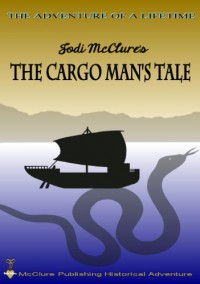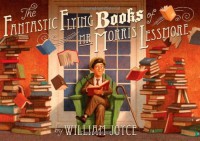Qui Est In Literis - MR Graham's Ramblings
MR Graham loves books. She loves the feel, the smell, and the stories inside. After careful consideration, however, she has decided the taste leaves something to be desired.
His Majesty's Dragon (Temeraire, Book 1)

The Good:
I think I'm developing a preference for black powder in my fantasy.
I really loved this book. I found it difficult to put down, which is an increasingly rare occurrence for me. This I think was due mostly to the excellent characterization and the very sweet, very true friendship between Temeraire and Laurence. It was very much unexpected, but I don't think spoils to much to say, that for a fanged flying machine of destruction, Temeraire is completely adorable. Laurence is a gentleman through and through, and understands the true purpose of etiquette: to grease the workings of society. He is not the cold, arrogant 'gentleman' that sometimes appears in fiction.
I am an absolute sucker for beautiful, formal language, and Novik chooses a register that meshes well with the world she has built. It is just archaic enough to evoke the era, without becoming convoluted or stodgy.
I was also very interested in the fact that there seems to be no magic at all in Temeraire's world. Dragons are just animals, albeit of human or near-human intelligence.
The Bad:
Not a turn-off for me, but something I know will disagree with some readers: the plot meanders. There does not seem to be a single, central problem for the story, other than perhaps Laurence's problem of learning how to navigate the society of the Aerial Corps. The book is largely an introduction to the characters and world-building preliminary to the rest of the series. For some, that may be a dealbreaker. For me, just a reason to hunt down the rest of the series quickly.
In Conclusion:
Recommended. It has the feel of classical literature or a national epic.
*Note: I received a free review copy of this book via Goodreads.
The Thousand Names: Book One of The Shadow Campaigns
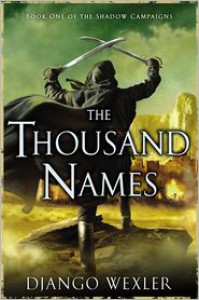 The Good:
The Good:I dig it. I really do. This was my first introduction to flintlock fantasy, and I loved it.
I loved Winter Ihernglass. She's a strong female protagonist without being a "strong female protagonist." Call me revolutionary, but I love it when authors write women as people. She works hard to pass for a man. She is strategically competent. She can fire a musket and wield a sword, but she never strays into the frigid automaton territory that often consumes "strong" heroines. She is also a caregiver, insecure, devoted to her friends, paranoid about blowing her cover, and trying desperately to cope with the crap life keeps throwing at her. Most importantly, she is defined by her circumstances and her actions, not by her relationships with men.
Colonel Janus Vhalnich was pretty awesome, as well. I have a thing for emotionally detached, scholarly, brilliant characters, and Janus struck me as particularly Holmesian. I'd say he almost seemed to be borderline Asperger's - hyperattentive, obsessive, with some trouble expressing his interests in ways other people can understand. I was wary of the character at first, because he came off as the setup for some deus ex machina, but my fears were unfounded, and he grew into something very, very interesting. I'd like to see passages from his perspective in future books.
The system of magic was extremely cool, and treated very originally. Actually explaining why would stray into spoiler territory, though.
Lastly, I loved that, though this is the first in a series, it ended with pretty thorough closure. All the major plot points were resolved, and though the end set up the basic conflict for the next books, there's no teeth-grindingly heinous cliffhanger. You could read it as a stand-alone.
The Bad:
The naming conventions. They felt very arbitrary to me, as though Wexler didn't bother to assign a set of phoneme frequencies or an orthography to each culture. The Vordanai have given names like Winter, Marcus, Jen, Janus, and Fitz, while the surnames that accompany them are Ihernglass, d'Ivoire, Alhundt, bet Vhalnich, and Warus. The Khandarai are Feor and Khtoba and Onvidaer and Jaffa. Neither set of names sounds as though it can be attributed to a single language or language family, and there was no cultural information given that could explain the disconnect.
In Conclusion:
Recommended for those who dig A Song of Ice and Fire and other such military-political fantasy.
*Note: I received a free proof copy of this book and was encouraged but not required to review. Said copy, being a proof, had not undergone final edits, and was a bit typo-laden. I assume most or all such errors have been rectified in the final publication.
Hellbender
 It was a bit strange to read Laurie King writing science fiction noir - almost like reading a mashup of The Dresden Files and The X-Files. I did enjoy it, though. If she kept coming out with these shorts, I'd keep buying them.
It was a bit strange to read Laurie King writing science fiction noir - almost like reading a mashup of The Dresden Files and The X-Files. I did enjoy it, though. If she kept coming out with these shorts, I'd keep buying them.
Andy Smithson: Blast of the Dragon's Fury (Book One): 1
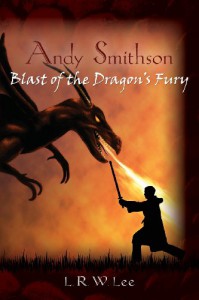 This was a really cute book, quick and easy to read, and longer than I expected it to be (which is a good thing). Even though it essentially boiled down to a series of Aesops, it never did fall into the trap of heavy-handed moralizing that Aesops often do, and the lessons it taught were well couched within the plot. The characters were all very likeable, each with fun little quirks, and the humor alternated between subtle and sweetly corny.
This was a really cute book, quick and easy to read, and longer than I expected it to be (which is a good thing). Even though it essentially boiled down to a series of Aesops, it never did fall into the trap of heavy-handed moralizing that Aesops often do, and the lessons it taught were well couched within the plot. The characters were all very likeable, each with fun little quirks, and the humor alternated between subtle and sweetly corny.There were a few places in which the plot slowed quite a bit, during which Andy was exploring, or the narrator was explaining something, and I think those expository passages could have been integrated much more smoothly. I also felt that the ending was much too abrupt, though it did come with a good amount of closure. Additionally, there were a number of small typos and incorrect word usage, but not nearly as many as one sometimes sees in a self-published book.
Overall, I enjoyed the read. It's something I would certainly consider giving any hypothetical future children of mine.
The Kentauride
 The Premise:
The Premise:Tanita wakes up, as the description indicates, in an abandoned factory, with a severe sedative hangover, sporadic memories, voices in her head, and her lower body grafted to a horse's neck. She has been kidnapped and genetically altered for the purpose of, eventually, being an attraction in a theme park, but the project has gone awry, and she has been abandoned to die. Fortunately, she is discovered by a teenager, Mark, and his little brother, David, before she can starve to death. They do all they can to make her comfortable until the unidentified villains return, and they are forced to move her to a friend's horse farm to hide. General romance ensues between Mark and Tanita while the villains continue to search for her. It's not until about the last 20% of the book that the villains catch up to them, and the romance gives way to violence, chases, tragedy, and drama.
I had a bit of a hard time categorizing this book, which made it hard to evaluate. It's not really what I usually read. The centaur angle made me think it was fantasy, and it seems to have been submitted on Amazon as fantasy, but I'd be more inclined to call it science fiction or science fantasy. I had also assumed that the main problem to be overcome would be Tanita's amnesia, but I finally concluded that it was actually a romance novel for men, and I'll review it accordingly.
The Good:
It's a smashing idea. I know that my personal geek circles periodically turn our conversation toward the possibility of science making our fandoms come true. For the Trekkies among us, it's already happening; we've gotten our automatic doors, flip phones, touch screens, rudimentary holograms, learning computers, and the very real potential for commercial space flight. The fantasy geeks have had a tougher time of it, and I was very interested in Landry's exploration of the problems that could cause. Technology is powerful, and thus dangerous, when coupled with businessmen of slippery morals.
I was especially drawn to the characters of Sam and Chloe, respectively the owner of the horse ranch on which Tanita is hidden, and Mark's older sister. Sam is a kind, sensible old man, and the only character who ever evinces confidence that Tanita is capable of taking care of herself. Chloe is probably the strongest character in the book, in terms of depth of personality, and gets to provide all the exposition for Landry's evidently very well-researched science.
The Bad:
I got the impression that The Kentauride was written for an exclusively male audience. A distracting amount of attention is paid to the fact that the theme park people altered Tanita to fit their personal standards of beauty, which includes DD breasts. In fact, a roughly equal amount of attention is paid to the breasts and to the sudden acquisition of a horse body, which struck me as unlikely, since one is at least natural, if not the norm, and the other is bizarre. Obviously, I cannot speak for the internal monologue of other women, but I rarely think about my own breasts unless they are in pain, and am irritated rather than flattered when other people stare at them.
Tanita's character is rather blank, which is understandable if she's essentially had her mind wiped and is, practically, only about a week old. Landry mentioned in his afterword that he had originally intended her to be a background character, and that Mark and Chloe were intended to be in the forefront. I think that would have made for an easier read, since Tanita's only real identity is in her relationship toward Mark.
I also had to take issue with some of the character's motivations, especially the repeated (three or four times, as I recall) statement that "whatever he told her to do, she would listen," in reference to Mark. At one point, she refuses to accept a weapon with which to defend herself, because Mark disapproves.
Additionally, the main descriptors used from Mark's point of view to indicate that Tanita is attractive are "childlike" and "too cute to take seriously."
The villains, who are mostly African American, speak in an extremely exaggerated Ebonics-esque dialect that was uncomfortable to read on several levels.
In Conclusion:
I found the plot rather interesting, and was eager to continue reading all the way through. To judge by other Amazon reviews, the book has a good reception among male readers, but I have yet to see female feedback. I would recommend this book on its merits: sound concept, good research, no loose plot ends that I saw, decent pacing. I would also caution the reader about the gender and racial stereotypes, instant romance, and some slightly distracting quick-shifts between the multiple viewpoints in the story.
I would also mention that there is some extremely explicit sex that I wasn't expecting, but that could be a positive or negative, depending on the reader.
Parched
 Parched was deeply powerful story of loss, mistrust, and survival, full of intense imagery and musical language. I read it all in one sitting, because there was no way I was going to be able to put it down.
Parched was deeply powerful story of loss, mistrust, and survival, full of intense imagery and musical language. I read it all in one sitting, because there was no way I was going to be able to put it down.
From Phonics to Fluency: Effective Teaching of Decoding and Reading Fluency in the Elementary School (2nd Edition)
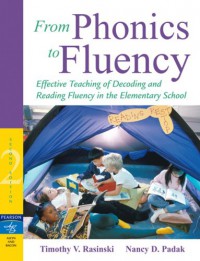 It was decent but very simplistic. Good ideas for literacy activities, good explanation of each, but I felt that this, like most books for elementary school teachers, talks down just a bit.
It was decent but very simplistic. Good ideas for literacy activities, good explanation of each, but I felt that this, like most books for elementary school teachers, talks down just a bit.
Titan Magic (Titan Magic, #1)
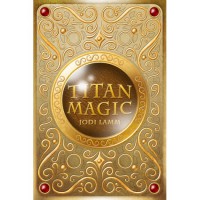 The Premise:
The Premise:Madeleine (Maddy) Lavoie is an invalid. Her memories go back only three years. She has very few emotions. She hears voices - including her own, though she has always been mute. She tries nightly to escape her family home and has to be physically restrained. She naturally assumes that she is insane. Her first inkling, though, that something is seriously wrong, comes when her brother suffers an extreme change in personality, ignores her for a year, and finally kicks her out of the house. Alone in nothing but a shift, corset, and greatcoat, she encounters a number of increasingly bizarre characters, almost all of whom seem to want to control her, most of whom treat her as something less than human. Her assessment of her own sanity isn't helped much by the fact that one of them is a talking stag who claims she is his property. Maddy's goal, then, is to discover whether she really is inhuman, avoid being controlled or killed, and figure out whether she is capable of or even wants to feel love as normal people do.
The Good:
Pretty much everything. I've reviewed Lamm before, and as before, her prose is stunning. She is a master of words. The plot she has crafted for Titan Magic is complex and unpredictable without falling into the trap of the outlandish that sometimes springs up when authors try too hard to defy convention.
I was very much intrigued by a protagonist who is both emotionless and mute, and I think Lamm dealt with those challenges admirably, especially given that the protagonist is female. It is very hard to find a female protagonist in fantasy (or any genre, really) who does not degenerate into hysterics at least once. Maddy is very practical and rational, except in one or two instances when she is supernaturally forced to endure someone else's emotions.
(As a slightly spoilery aside, I did take issue with her placing a woman in a position of "natural" servitude, at least for the first few chapters. Once I realized where she was going with it, though, I rejoiced in the allegory. Maddy's journey is very much womankind's journey from object to personhood as she seeks her voice and her own agency.)
Her world-building was beautiful, rich and complex without beating the reader over the head with the place's history. I do want to know more, though, about this political system and the old religion and the mythology. I hope for more tasty tidbits in the sequel.
The Bad:
Not much. As some other reviewers on Goodreads have noted, there was an awful lot going on, and an awful lot of plot threads to keep track of, which made me go back to check on things once or twice. Also, while I found Maddy very interesting, it was difficult for me to connect with her for about the first half of the book. (I think this might be partly because of the word heartless in the blurb, which lead me to expect more cruelty than apathy.)
There were exceptionally few typos in the book, but I did notice that the author consistently used "bore" for "bared" in reference to characters exposing their teeth. However, the version I read was the version the author emailed to me, and that might be corrected in the version available for sale.
The Interesting:
Or, things that stood out to me, but that I wasn't sure whether to call good or bad.
*SPOILERS*
Lamm seemed to be setting up something like an ironic love triangle, in which neither potential love interest really worked well. Marcus is the brother, who later is revealed to be a sort of foster brother, who later is revealed to be a powerful supernatural creature without any real blood connection to the family. He can be pitied for his mood swings, which are caused by his being possessed, in a way, but toward the end, he turns up as bat-wig insane, even when not possessed. He seems to want Maddy to share in his world-domination, but is perfectly willing to use her up to get what he wants for himself. Jas, who turns out to be Maddy's creator, is described in various relationship roles, including mother and god. He starts out very whiny and self-pitying, which is addressed by other characters with all the appropriate disdain and exasperation. His character does evolve admirably. However, while he can be excused for having complete control over his creation, he uses that control to coerce her into actions she does not want to take, even after it becomes obvious that she has acquired a real personality. Of course, he has been brainwashed into believing her incapable of being a person, and does eventually come to see her as real, but I found it incredibly awkward that she should be romantically interested in someone who treated her as an inanimate object for most of her life.
That's both good and bad. I enjoyed the emotional contortions the characters had to go through, which is very much in agreement with real life, but I think I would have been happier if Maddy had ended up on her own for a little while.
*END SPOILERS*
In Conclusion:
I recommend it. Lamm has given me the opportunity to beta-read the sequel before she publishes it, and I'm chomping at the bit to get into it.
Also, I'm not sure whether Lamm intended this book as YA or not. Several Goodreads users have categorized it as Young Adult, but I read it as a much more mature character study. I enjoy YA, but the majority of the genre is nowhere near as sophisticated as Lamm's work, and I think that readers who go into Titan Magic looking for fast plot and romance will be disappointed. Readers would be better off going in with the attitude that they will be given a thoughtful critique of humanity, couched in a fantasy framework.
Exophobe
 Shall I say hurray? It took me long enough to get through this, for which I am deeply ashamed.
Shall I say hurray? It took me long enough to get through this, for which I am deeply ashamed. I was warned about lame puns, and lame puns there were aplenty. That's all fine, because lame puns are the best kind. Lame puns aside, Exophobe was a very smart read. Witty, sharp, hilarious at times, occasionally poignant, slightly pungent in places. I'm sure it says something that my personal favorite character was essentially the voice of the protagonists's Palm Pilot. I'm looking forward to the sequel.
Sidney Chambers and the Perils of the Night
 Much mystery, caught up in its attempt at edginess, loses itself in gratuitous sex and gore. Edginess has its place, of course, but I’ve grown tired of it. I wanted to take a few steps back from the edge.
Much mystery, caught up in its attempt at edginess, loses itself in gratuitous sex and gore. Edginess has its place, of course, but I’ve grown tired of it. I wanted to take a few steps back from the edge.Sidney Chambers has provided for me a much needed break. I found the reading at once light and weighty, a balance between vibrant, whimsical characters and their brushes with the darker side of human nature. The language is elegant and cerebral without being overbearing, and it fits the period without feeling stilted.
The episodic structure of the book – a series of short storied, tied together by a few threads into a loosely-bound whole – threw me off a little at first, but I quickly decided to allow myself one story a day, and the subdivision into manageable chunks became a convenience.
What I loved most, though, was the title character, the clerical detective, Canon Sidney Chambers. Much in the tradition of Father Brown, Sidney shows a deep and sensitive understanding of humanity, flaws included, and yet retains a wonderful optimism and innocence, reaching out to touch the sinner without letting himself be touched by the sin. In some ways, he perhaps surpasses Father Brown in realism: in the difficulties of his relationships, his flashes of human jealousy, his worries that his academia or detective work sometimes interferes with his priestly duties. Where moral ambiguity has become the norm for protagonists, Sidney is proof that it is by no means a necessary attribute of a complex, interesting character; I found his uprightness refreshing.
My only complaint would be the overabundance of cricket jargon in The Hat Trick, the fourth story in the collection.




